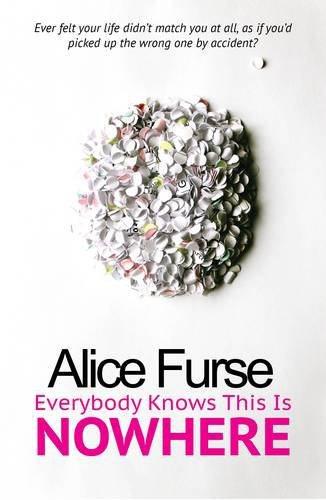Everybody Knows This Is Nowhere, by Alice Furse
It takes a particular talent to depict boredom without being boring; to show stasis without losing the reader along the way. In Everybody Knows this is Nowhere, Alice Furse brilliantly captures that awful sense that your life is happening almost independently of you, trundling along without any regard to what you might have wanted from it.
The unnamed narrator in Everybody is recently graduated, finally starting to live her independent adult life. It’s not what she’d hoped for. Her English degree isn’t in much demand; her boyfriend from university whom she loves has only managed to find work as a traffic warden; and she spends her days watching daytime tv, eating toasted cheese sandwiches and buying second-hand books. She “had been led to believe that such a lifestyle would be romantic and bohemian, but it was neither.”

She gets a data input job at a company called Weblands. It’s not entirely clear what they do there, or if anyone would much care if they stopped doing it. It’s a heads-down sort of place, and she doesn’t have much in common with the rest of the staff. She turns up, fills out forms online, eats lunch, fills out more forms, goes home. All her education and aspirations have led to this, and what’s worse is she doesn’t even have an idea of what might be better.
One day, I got up at 17.00 and said, “Goodbye, everyone,” to all of the customer services. No one even looked up.

Life with her boyfriend is settling into the ordinary routines of buying groceries, cooking dinner, cleaning the flat, arguing with neighbours over noise or bins, mundanity. I suspect most people reading this blog have been there and it’s a bloody time; that Schrodinger collapse from the student world of freedom and possibility into a life suddenly crammed with structure and things that have to be done just to keep everything ticking along.
After two months of living with the Traffic Warden it was obvious that our trips round the supermarket had changed from when we’d been students. We were not stoned and in pyjamas, there to pick up ready-made potato wedges and muffins and chocolate milk and fags and then speed back to the warmth of my messy bedroom. Suddenly we were a Young Couple who had a small trolley together instead of a basket each and argued over salt content and what bread to get.
The traffic warden (she never gives his name) is showing signs of being more traditional than she’d realised when they were at university. He figures that eventually she’ll give up work, have children and stay at home. He has their life mapped out, but he hasn’t asked her about it as it didn’t occur to him her plans were any different. She loves him, but that doesn’t stop her feeling lonely.
In one sense Everybody is an utterly contemporary book, showing exactly what it’s like to find yourself with a useless degree and a mountain of student debt emerging into an economy that has no use for you. In another sense though it captures a classic moment of crisis – that shock of finding quite how dull the adult world can be, that sense of being adrift while you try to work out what the hell you want to do with your life and if there’s any chance of actually doing it.
Sometimes I decided that there had to be another life out there, waiting for me to step into it like a new shoe. My life felt as if it didn’t match me at all, as if I’d picked up the wrong one by accident. I’d arrived here by mistake, taken a wrong turning on the map. I imagined that I was a character in a video game, and there was a button for a trapdoor, to take me to the next level, somewhere else, anywhere else, and all I had to do was find it.
What’s rather wonderful about Everybody is that all this could be terribly bleak, or worse yet dull, and yet it isn’t. Furse has a neat sense of comedy, partly in situations like the narrator’s habit of stealing office supplies as a form of revenge on the tedium of office life, but mostly in Furse’s deadpan tone.
Some of the humor here is decidedly pointed, such as the slightly surreal series of visits by an elderly neighbor who refuses to speak to the narrator and who when she asks a question replies as if it had been the traffic warden instead of her who’d spoken. It reminded me of restaurants I’ve been too where my wife asks for the wine menu only for it to be given to me, where she then chooses the wine only for them to offer me the chance to taste it, and where if she asks for the bill they hand it to me (restaurants we don’t go back to I should add).
In one of the cleverer aspects of the novel, Furse early on sharply defines the characters of the narrator and the traffic warden, but the office staff seem fuzzy and interchangeable. As the book progresses their personalities emerge too, reflecting the narrator’s increasing ability to distinguish between them. It’s elegantly done, so that by the time you’re two-thirds of the way into the novel people who at first seemed to be bland clones of each other have become utterly separate and convincing. To her horror the narrator realises that some of them, maybe even all of them, may be having the same doubts she is and may be just as bored and surprised by the life they find themselves living.
It’s easy to see how one could say this is a novel about the problems of being a young woman or a new graduate in modern Britain, but I’m none of those things and yet it resonated hugely with me. I think that’s because while at one level it’s all very particular and specific, the underlying emotions are ones many of us have had.
As I was reading Everybody I was reminded of Post Office and Factotum, Bukowski’s forensic examinations of the absurdity of work (and by his economy of style too). Interestingly, just as I was thinking that the narrator picked up a copy of a Bukowski that her boyfriend was reading. She doesn’t like it, finding the ease with which he gets women to sleep with him in his narrative fantastical and pathetic given he’s an aging alcoholic with a ruined body (which is a pretty fair point). Perhaps that’s another way to view Everybody, as like a Bukowski novel with a young contemporary woman in place of an aging alcoholic man.
Looking back at my writeup of Factotum I see I said “The point is looking straight at what is and writing it down.” That sentence works pretty well for Furse too. She looks at what is and she writes it down. Put that way it sounds simple, but if it were more writers would be doing it.
Other reviews
Anthony of Timesflowstemmed wrote an elegant and punchy review of Everybody here, which first alerted me to the book and without which I would never have heard of it. There’s another excellent review here from the marvellously named Workshy Fop blog, which I note also calls the book deadpan. It’s always reassuring to find someone else describing a book the same way as you have yourself, it suggests you haven’t utterly missed the point (or if you have at least you’re not the only one who has).
Finally, there’s a nice interview with Furse here on Dan Holloway’s blog. Furse says at one point “I like cold hard reality and no frills dialog.” which is certainly true, and absolutely key to the book’s success. Also, she argues that Plath’s Bell Jar isn’t just for teenage girls, which I absolutely agree with and which I think is an incredibly dismissive way to treat a genuinely classic novel. “It was a queer, sultry summer, the summer they executed the Rosenbergs, and I didn’t know what I was doing in New York.” Seriously, that’s a great opening line for any book.
Filed under: Furse, Alice Tagged: Alice Furse

